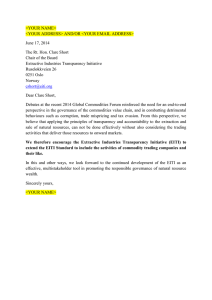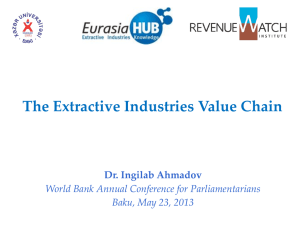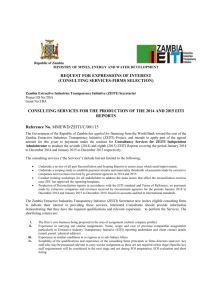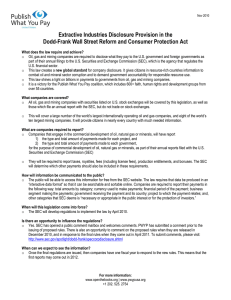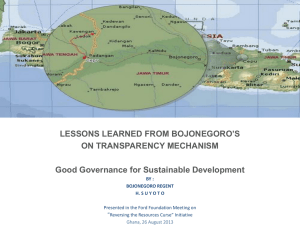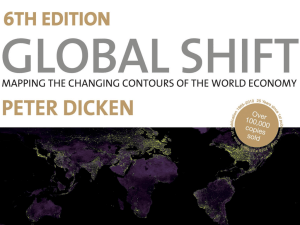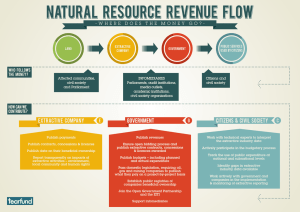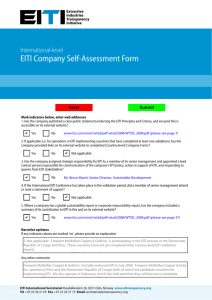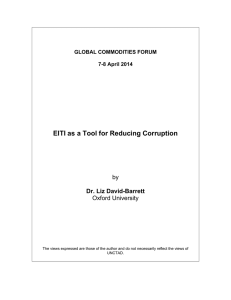I CGD Notes Promoting Universal Transparency in Extractive Industries: How and Why?
advertisement
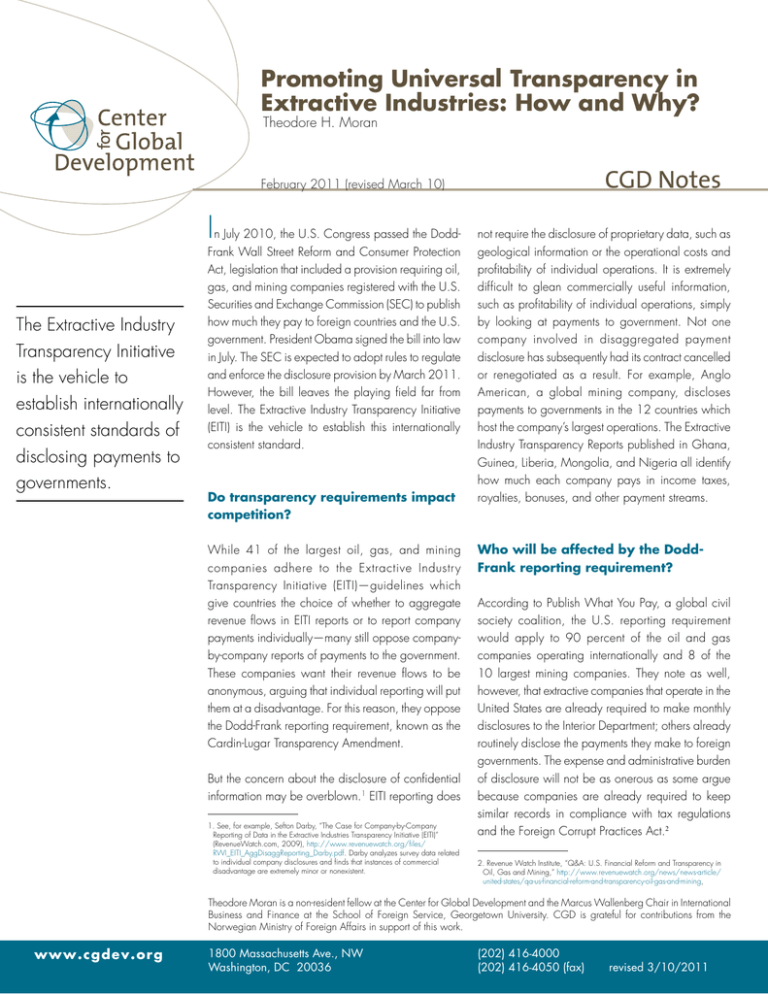
Promoting Universal Transparency in Extractive Industries: How and Why? Theodore H. Moran CGD Notes February 2011 (revised March 10) I The Extractive Industry Transparency Initiative is the vehicle to establish internationally consistent standards of disclosing payments to governments. n July 2010, the U.S. Congress passed the DoddFrank Wall Street Reform and Consumer Protection Act, legislation that included a provision requiring oil, gas, and mining companies registered with the U.S. Securities and Exchange Commission (SEC) to publish how much they pay to foreign countries and the U.S. government. President Obama signed the bill into law in July. The SEC is expected to adopt rules to regulate and enforce the disclosure provision by March 2011. However, the bill leaves the playing field far from level. The Extractive Industry Transparency Initiative (EITI) is the vehicle to establish this internationally consistent standard. Do transparency requirements impact competition? While 41 of the largest oil, gas, and mining companies adhere to the Extractive Industr y Transparency Initiative (EITI)—guidelines which give countries the choice of whether to aggregate revenue flows in EITI reports or to report company payments individually—many still oppose companyby-company reports of payments to the government. These companies want their revenue flows to be anonymous, arguing that individual reporting will put them at a disadvantage. For this reason, they oppose the Dodd-Frank reporting requirement, known as the Cardin-Lugar Transparency Amendment. But the concern about the disclosure of confidential information may be overblown.1 EITI reporting does 1. See, for example, Sefton Darby, “The Case for Company-by-Company Reporting of Data in the Extractive Industries Transparency Initiative (EITI)” (RevenueWatch.com, 2009), http://www.revenuewatch.org/files/ RWI_EITI_AggDisaggReporting_Darby.pdf. Darby analyzes survey data related to individual company disclosures and finds that instances of commercial disadvantage are extremely minor or nonexistent. not require the disclosure of proprietary data, such as geological information or the operational costs and profitability of individual operations. It is extremely difficult to glean commercially useful information, such as profitability of individual operations, simply by looking at payments to government. Not one company involved in disaggregated payment disclosure has subsequently had its contract cancelled or renegotiated as a result. For example, Anglo American, a global mining company, discloses payments to governments in the 12 countries which host the company’s largest operations. The Extractive Industry Transparency Reports published in Ghana, Guinea, Liberia, Mongolia, and Nigeria all identify how much each company pays in income taxes, royalties, bonuses, and other payment streams. Who will be affected by the DoddFrank reporting requirement? According to Publish What You Pay, a global civil society coalition, the U.S. reporting requirement would apply to 90 percent of the oil and gas companies operating internationally and 8 of the 10 largest mining companies. They note as well, however, that extractive companies that operate in the United States are already required to make monthly disclosures to the Interior Department; others already routinely disclose the payments they make to foreign governments. The expense and administrative burden of disclosure will not be as onerous as some argue because companies are already required to keep similar records in compliance with tax regulations and the Foreign Corrupt Practices Act.2 2. Revenue Watch Institute, “Q&A: U.S. Financial Reform and Transparency in Oil, Gas and Mining,” http://www.revenuewatch.org/news/news-article/ united-states/qa-us-financial-reform-and-transparency-oil-gas-and-mining, Theodore Moran is a non-resident fellow at the Center for Global Development and the Marcus Wallenberg Chair in International Business and Finance at the School of Foreign Service, Georgetown University. CGD is grateful for contributions from the Norwegian Ministry of Foreign Affairs in support of this work. www.cgdev.org 1800 Massachusetts Ave., NW Washington, DC 20036 (202) 416-4000 (202) 416-4050 (fax) revised 3/10/2011 CGD Notes Table 1. Reporting Requirements Vary Across Extractive Investors, Creating an Uneven Playing Field Companies That Have to Meet SEC or Similar Reporting Requirements Companies That Do Not Have to Meet SEC or Similar Reporting Requirements China Sinopec (China Petroleum and Chemical Corporation). China National Petroleum Corporation (CNPC) CNOOC (China National Offshore Oil Corporation). Sinochem. Chinalco (Aluminum Corporation of China). Yankuang. China Minmetals Corporation. Shenhua Group Corporation. Shougang Group Baosteel Group Corporation. Nanchuan/Bosai. China Machinery and Electrical Equipment Export and Import Company. China National Geological and Mining Corporation (CGM). China Non-Ferrous Metals Mining Group (CNMC). Jinchuan. Luanhe Industrial Group. Tonghua Iron and Steel. Wuhan Iron and Steel. Russia Rosneft. Lukoil.Gazprom. Norilsk Nickel. Severstal. Evraz. Rusal. Surgutneftegaz. Gazprom Neft. Tatneft. Uralkali. India Essar Oil. Coal India. Indian Oil Company. Reliance Petroleum Vendata Resources. Aditya Birla Group. International extractive companies and their governments should work to make the Extractive Industry Transparency Initiative (EITI) require all EITIcompliant countries to require individual company-by-company reporting. Will the Frank-Dodd Requirement Disadvantage Companies Registered with the SEC? on an equivalent basis. The Extractive Industry Transparency Initiative (EITI) is the vehicle to establish this internationally consistent standard. Many of the largest natural resource companies based in China, Russia, and India will not have to disclose their payments, leaving the playing field far from level. Three of the seven largest Russian energy companies are registered in the United States, but three are not. Of the 16 largest Chinese mining companies with overseas operations, two are listed in New York and three in Hong Kong. Eleven do not have listings outside of China. Two of the three largest Indian oil companies are not listed in the United States (see table 1). International extractive companies and their governments should work to make the Extractive Industry Transparency Initiative (EITI) require all EITIcompliant countries to require individual companyby-company reporting. Many thought leaders among oil, gas, and mining companies have come to realize that company-by-company reporting is in their selfinterest. Newmont Mining, for example, supports a mandatory reporting rule for all companies. Peter Eigen, outgoing chair of EITI, argues that the DoddFrank framework reinforces the work of the EITI. While some Chinese, Russian, and Indian investors in the extractive sector around the world would be covered by the U.S. SEC reporting requirement, numerous other investors that are active in Africa, Latin America, Asia, and the Middle East would not be required to disclose their payments. The Dodd-Frank reporting requirement therefore will leave a highly unequal playing field around the world. Leveling the Playing Field A growing number of natural resource companies are recognizing that conventional wisdom must be turned on its head: an internationally consistent standard requiring company-by-company reports will ultimately benefit the most conscientious investors, by forcing all participants (including those from Russia, China, India, and elsewhere) to provide transparency 2 www.cgdev.org A new SEC reporting requirement may set in motion the same dynamic that followed the original passage of the 1977 U.S. Foreign Corrupt Practices Act (FCPA). U.S. investors initially objected to being put at a competitive disadvantage by the FCPA, but when Warren Christopher became Secretary of State to orchestrate the effort, they pushed for adoption and ratification of the OECD-wide Convention on Combating Bribery. International corporate support for all EITI countries to require individual company-bycompany reporting would force non-OECD investors to comply, thereby leveling the playing field for OECD and non-OECD investors alike. This year, 2011, presents a unique opportunity to promote universal transparency in the extractive industry. Participants at the March EITI Global Conference should endorse the requirement that all EITI-compliant countries require individual company-by-company reporting. accessed February 14, 2011. 1800 Massachusetts Ave., NW Washington, DC 20036 (202) 416-4000 (202) 416-4050 (fax)
